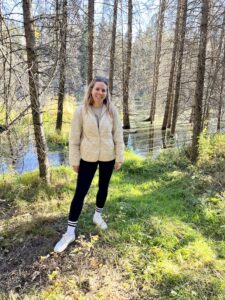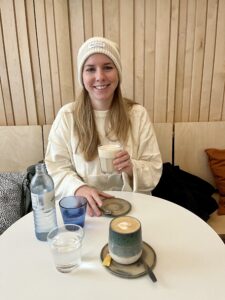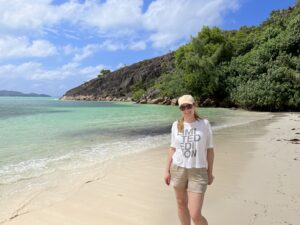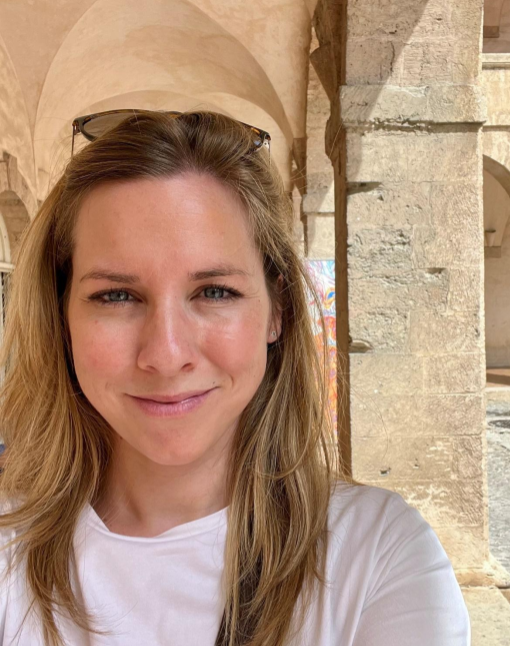By Sonia Arzt

To tell the story of my aneurysm journey, I have to take you quite a while back, to 2017. From the time that I was a teenager, I experienced migraines with aura about once or twice a year. Since they were never really severe, I didn’t seek help from a neurologist up to until I was 27. At that point, I thought that it was just the responsible thing to do, to get professional confirmation that it really was just a regular migraine. The neurologist sent me to get an MRI as a standard procedure.
This was my first MRI ever. I was worried about the tube since I am a bit claustrophobic, but not for a second had it crossed my mind that the result should be the thing to worry about. I was absolutely sure that everything was fine.
Later the same day, I received an email notification – my MRI report. I browsed through the medical report, eventually reading the words “3-4 mm aneurysm”. Those words meant nothing to me at that time so I started researching the diagnosis that I had just been casually handed via email. I basically went right down the rabbit hole of Dr. Google, and somewhere on the way I came to the realization that this was really serious. I slowly connected the dots that an aneurysm must be what killed my aunt when I was a little child – the only thing I had remembered was that she had bleeding in her brain.
My head was spinning. I couldn’t stop reading horrible stories about brain aneurysms all over the internet. I also remember reading that high blood pressure is a major risk factor, so without knowing what my blood pressure even was, I started frantically cutting out everything I thought was increasing my blood pressure. I panicked over a chocolate bar that my husband had bought for me to comfort me. At that moment I thought I couldn’t eat it anymore since it would raise my blood pressure and eventually kill me. I desperately needed to get some expert advice. Being left alone with this diagnosis was simply driving me insane. Within only a couple of days, I seemed to have lost the ability to feel light, with an unknown heavy weight weighing down on me.
It took a couple of weeks until I could finally talk to professionals about the diagnosis. In the end, I talked to three neurosurgeons at three different hospitals and got opinions ranging from “surgery right away”, to “probably surgery pretty soon” and finally to “best to monitor it for a while since the surgery also bears quite a bit of risk”. It was up to me to decide. At this point they had all agreed that clipping would be the only possible treatment, due to the shape of my aneurysm, meaning undergoing a full craniotomy.
This was all overwhelming to say the least, I was also in the middle of planning my wedding scheduled for later that year. I went with the advice of the only doctor whom I felt understood me, he was the only one who seemed to have seen me as a human being, shaken to the core and in need of a doctor who could treat this as the big deal that it was to me.
We started the process of monitoring. While those appointments always made me nervous, after the second one showing no changes to my aneurysm, I developed a kind of a routine and an expectation that this thing was just going to stay the way it was. In fact, it did stay that way for over 6 years.
Going this route also meant for me that I had to learn to live with this “ticking bomb” in my head. There were times when I was pretty ok with it, and there were times when I cried on the bus going into work, because the aneurysm was weighing on me so heavily. Over time, I regained some confidence and lived my life quite normally, but it would be a lie to say that there was a single day where I didn’t feel the fear bubbling beneath the surface.

In June 2023, I had my standard MRI check-up. About 3 days later, I got the call with the definitive advice for treatment since my aneurysm had changed in shape. Now in contrast to 6 years ago, thanks to the progress in science, both coiling and clipping would have been possible. The decision was again up to me.
Over the years, I had read a lot about the different treatment options and I would have considered myself to have been well-informed. But when it comes to these enormous decisions, what else is there to rely on other than your gut feeling?
I was in shock. I was feeling physically weak, tired and depressed. I couldn’t believe that I was actually facing brain surgery.
I have always been someone who focuses on solutions. After the initial shock, I got back into my functioning mode. I trusted my gut feeling when deciding for the craniotomy to clip the aneurysm. Due to a lack of staff in the Austrian healthcare system, which only worsened with the covid pandemic, I was only given a surgery date for three months later.
At this point, I thought a lot about potentially dying from this surgery, but my biggest fear in reality was that there would be complications, cognitive deficits, effects to my personality etc. not allowing me to be me any more after the surgery.
As the surgery date was approaching and I had just begun to feel kind of mentally prepared, I got the call from the hospital that they had to postpone my surgery for another two and a half months. I was devastated. I felt like I would crumble, I just simply felt that I wouldn’t have the mental strength and the resilience to wait that much longer.
It took longer than usual for me to regain my functioning mode this time. I had this initial flight urge, needing to get out of my home and out of this situation. Traveling was my “solution”, and while I would agree in general that you can’t flee from your feelings, man did I flee.
I finally checked into the hospital on November 7, 2023. It helped me a lot that everyone was really nice, from the staff to my roommate. I am still joking today that they must have already been putting something in my water, because I felt weirdly calm all afternoon.
The night wasn’t so calm, and neither was the morning, I woke up with a heavy weight on my chest. At 7:00 am, I got picked up to go into the surgery. It still took around an hour with all the preparations, and one tearful nervous meltdown later, shortly before 8:00 am, the lights finally went out when my anesthesia kicked in.
The first thing that I remember afterwards is waking up, shivering like crazy, feeling cold, crying. I asked the nurses if my surgery was successful, and they said yes. I spent one night in the ICU. I started to test my brain very early on. I tried to remember all kinds of things e.g. thinking of where I had previously gone on vacation, and I was happy because it seemed like my brain was working fine and so was my body from what I could tell at that point.
My head was hurting quite a bit. The meds helped somewhat but I still was left with a bit of pain, which was also what I had expected though.
I am still overwhelmed with how nice the nurses in the ICU were. Never would I have imagined how much comfort it could give me that a stranger compliments me on my hair while brushing and braiding it.
The physiotherapist came by while I was still in ICU and made me stand up and walk a couple steps with him. It felt like I “passed the test”. They released me from ICU into the normal unit right after and I was allowed to get up on my own whenever I wanted, I had much more independence right from the start than expected.
I underwent a CT angiography the day after surgery. My surgeon came by to deliver the good news that also the CT had confirmed the success of the surgery. This was the first time I realized: “this went as well as it could have!” However, it felt too early to celebrate, I was still in fear that something could go wrong, such as some infection or bleeding etc. – whether that was really realistic at this time or not, I guess that I just wasn’t ready to let go of my long built-up fear at that point.
On day 5 after the surgery, I was released from the hospital. At home, I had already prepared the guest bed with a lot of pillows, including a wedge pillow (which was recommended by a fellow brain aneurysm survivor) for me to take comfortable rests. I took naps during the day for the next couple days. I took it very easy for the next approx. 4 weeks, watching a lot of TV but also starting with walks, and little adventures into town relatively soon, always in the best company of my husband. I expected to have fatigue but once my scar healed a bit, and I was able to sleep more comfortable again, I would say that my energy level came back to somewhat normal. I still made it a point to not fill my days too much and allowed myself to rest a lot. I felt guilty for having my husband take on so much more, but after all, I did what the doctor prescribed: nothing.

Writing this now, I am almost 6 months post-surgery. I am so proud of my body for mastering this challenging time like a rockstar. Despite some itches and numb feelings around the scar, I feel perfectly normal, I was able to start workouts again 8 weeks after surgery and already went on my first flights in week 11 and 14 after surgery (have I mentioned that I love traveling?). It took me quite some time to also mentally arrive at the thought that I was ok again. It felt like having to relearn feeling light, not having this cloud hanging over me. After all, this fear had been built up for almost 7 years, and I guess that it would have been weird for it to vanish from one day to the other.
I was extremely fortunate to have surgery before a rupture and that my surgery was so successful and my recovery went so smoothly, which I know is just not the case for everybody sharing a similar aneurysm story. Because I was doing so well physically, looking back, I now have to say that for me personally the mental challenge and pain outweighed the physical one. I decided relatively early on in my aneurysm journey to seek psychological help which was a great support for me.
What also helped me a lot was to find others who have gone through similar experiences. Instagram was a good source for me to connect with survivors, read their stories and it’s also where I found WeRunWithYou. Listening to their podcast gave me so much hope leading up to my surgery. Sharing my story, I want to give hope to others as well, because I know that when handed this diagnosis, you might sometimes feel like there is none.

Sonia Arzt
Sonia lives in Austria, Europe together with her Canadian husband. She works in Human Resources, a job that goes well with her communicative, open personality. In her spare time, Sonia loves travelling and is very happy that she can still do so after her successful brain aneurysm clipping in November 2023. The experience of living with a brain aneurysm for almost seven years and then getting it treated asked a lot of her mental resilience – the experience made her appreciate the strength of her body and made her learn to have more trust and faith in the positive outcome of things.




